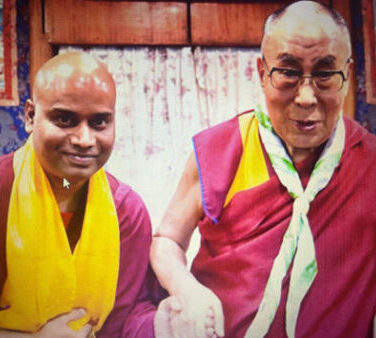
A Shamatha and Vipassana Meditation Retreat with Geshe Tenzin Lhabsum
Duration: 1 Week
Objective:
In today’s fast-paced and often divisive world, stress and anxiety can easily take hold. Mindfulness, combined with insight, offers both healing and freedom. By approaching our ever-changing thoughts and emotions with mindful, loving awareness and courage, we can cultivate clarity, inner spaciousness, and healthier responses to life rather than becoming trapped in habitual reactions and struggles.
This course offers a practical and accessible approach to meditation, helping you cultivate calm, focus, and deep insight in daily life. Through the foundational practices of Shamatha (calm abiding) and Vipassana (insight meditation), you will learn how to quiet the mind, develop emotional balance, open your heart and see life with greater clarity and wisdom.
Guided by core Buddhist teachings including Ethics, The Four Immeasurables, The Four Noble Truths, Dependent Origination, and Impermanence – this course blends theory and hands-on practice to make meditation meaningful and transformative. Whether you are a beginner or looking to deepen your practice, you will gain tools to cultivate lasting inner peace and harmony in everyday life.
Day 1
Foundations – Ethics & Mindfulness
7:30 – 8:30 Breakfast
8:30 – 10:30 Lecture Introduction
10:30 – 11:00 Tea Break
11:00 – 12:00 Lecture Ethics as a foundation
12:00 – 2:00 Lunch Break
2:00 – 2:30 Mindful Meditation
2:30 – 3:00 Tea Break
3:00 – 5:00 Lecture Shamatha
5:00 – 5:30 Break
5:30 – 6:30 Lecture Mindfulness of Breath – Mindfulness in Daily Life
6:30 – 7:30 Dinner Break
7:30 – 8:00 Mindful Meditation
8:00 – 8:30 Discussions. Q&A
Day 5
Impermanence & letting go of craving
7:00 – 7:30 Meditation
7:30 – 8:30 Breakfast
8:30 – 10:30 Lecture Impermanence.
10:30 – 11:00 Tea Break
11:00 – 12:00 Lecture Q&A on Impermanence.
12:00 – 2:00 Lunch Break
2:00 – 2:30 Mindful Meditation
2:30 – 3:00 Tea Break
3:00 – 5:00 Lecture Analytical meditation on impermanence.
5:00 – 5:30 Break
5:30 – 6:30 Lecture Q& A – Debate
6:30 – 7:30 Dinner Break
7:30 – 8:00 Mindful Meditation
8:00 – 8:30 Discussions. Q& A
Closing Ceremony: Dedication of Merit – Group Meditation: Dedication of merit for the benefit of all beings. – Closing Talk: The importance of maintaining a steady practice in daily life.
Facilitators:
Geshe Tenzin Lhabsum (GomChen) is an Indian monk from Mumbai who trained in the Tibetan Buddhist tradition of Sutra and Tantra and got his Doctorate from the Institute of Buddhist
Dialectics in Dharmsala and his Geshe degree from Drepung Gomang Monastery (Karnataka) on October 2021.
He used to be an electronics engineer and worked as a professional sound engineer for 11 years before giving up everything in 2004 and heading for the mountains of Dharmsala. There he spent
three years studying the Tibetan language, after which he received his ordination from His Holiness The Dalai Lama and took up the 16-year study programme at the Institute of Buddhist
Dialectics, studying Buddhist logic, philosophy, and epistemology. Along with his studies, he spent the last 10 years of the programme teaching young monks English literature, science, and
philosophy. The Dalai Lama’s Office recognises him as the second non-Himalayan Indian and the first from Mumbai to complete the Doctorate in Buddhist philosophy.
Please note- “attendance in all sessions is mandatory.”
For queries, registration & accommodation, please email: info@deerpark.in
